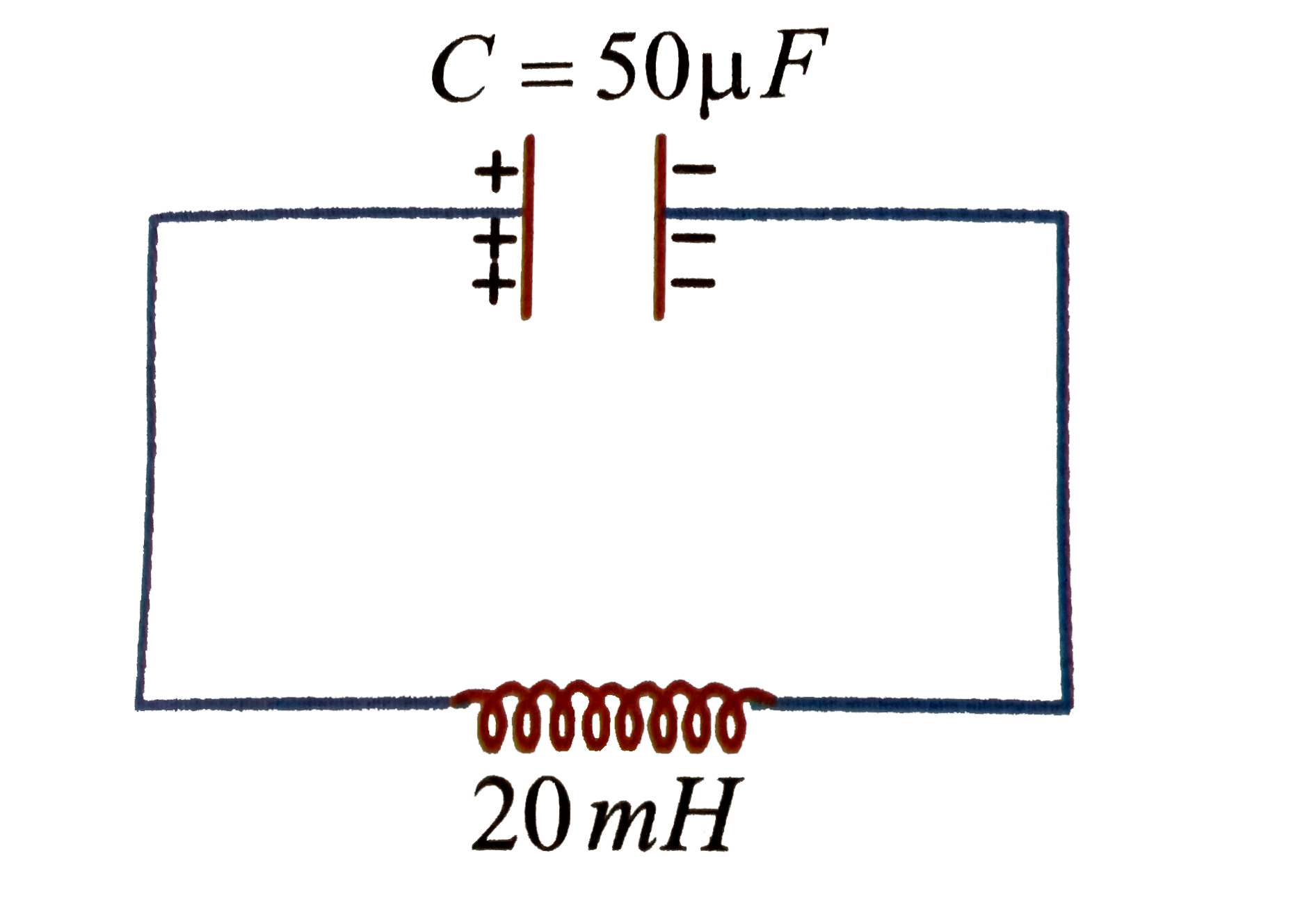An LC circuit contains a 20 mH inductor and a 50μF capacitor with an initial charge of 10 mC. The resistance of the circuit is negligible. Let the instant the circuit is closed be t = 0.
(a) What is the total energy stored initially ? Is it conserved during the oscillalions?
(b) What is the natural frequency of the circuit?
(c ) At what time is the energy stored? (i) Completely electrical ? (ii) Completely magnetic ?
(d) At what time is the total energy shared equally between the inductor and the capacitor ?
(e) If a resistor is inserted in the circuit, how much energy is eventually dissipated as heat ?
(a) L = 20 mH = 20 ×10−3 H
C = 50 μf=50×10−6 F
q0=10mC=10−2 C
Total initial energy
U0=12q20C=12×10−2×10−250×10−6J = 1.0 J
Yes , sum of energies stored in L and C is conserved If R = 0
(b) Natural frequency of the circuit is
f = 12π√LC
f = 12×3.14√20×10−3×50×10−6
(C) (i) charge on the capacitor at any instant is
q = q0 cos ωt
or q=q0cos(2π)T t
The energy stored will be completely electrical when the charge will have maximum value.
when t = 0 , T2,T,3T2 .....
(ii) Energy stored is completely magnetic when electirc energy as well as charge on the capacitor will be zero , ie.for
t =T4,3T4,5T4 .....
(d) Maximum energy stored in capacitor = 12×q20C
Half the total energy =12(12)×(q02C)
= 12x(q0√2)2C
energy will be half when charge becomes q0√2
q = q0 cos ωt
⇒q0√2=q0cos(2π)T t
cos(2π)Tt=1√2=cos(2n+1)π4
t = (2n + 1) T8
energy will be half when
t = T8,3T8,5T8.....
here, T = 1f = 6.3 ms
(e) The resistance damps out the LC oscillations eventuall .
the whole of the initial energy equal to 1.0 J is eventually dissipated as heat.
Topper's Solved these Questions
- ALTERNATING CURRENT BOOK - MODERN PUBLICATIONCHAPTER - ALTERNATING CURRENT EXERCISE - NCERT FILE EXEMPLAR PROBLEMS Subjective Question (VERY SHORT ANSWER TYPE QUESTIONS)
13 Videos
- ALTERNATING CURRENT BOOK - MODERN PUBLICATIONCHAPTER - ALTERNATING CURRENT EXERCISE - HIGHER ORDER THINKING SKILLS & ADVANCED LEVEL
7 Videos
- ALTERNATING CURRENT BOOK - MODERN PUBLICATIONCHAPTER - ALTERNATING CURRENT EXERCISE - NCERT FILE (TEXTBOOK EXERCISES )
11 Videos
- ATOMS BOOK - MODERN PUBLICATIONCHAPTER - ATOMS EXERCISE - Chapter Practice Test
16 Videos
Similar Questions
An LC circuit contains a 20 mH inductor and a 50 uF capacitor with an initial charge of 10 mC. The resistance of the circuit is negligible. Let the instant, the circuit is closed be t = 0.
(a) What is the total energy stored initially ? Is it conserved during LC oscillations ?
(b) What is the natural frequency of the circuit ?
(c) At what time is the energy stored
(i) completely electrical (i.e., stored in the capacitor)?
(ii) completely magnetic (i.e., stored in the inductor)?
(d) At what times is the total energy shared equally between the inductor and the capacitor ?
(e) If a resistor is inserted in the circuit, how much energy is eventually dissipated as heat ?
View SolutionAn L–C circuit contains inductor of inductance L and capacitor of capacitance C with an initial charge q0. The resistance of the circuit is negligible. Let the instant the circuit is closed be t = 0.
(i) What is the total energy stored initially?
View Solution
Knowledge Check
An LC circuit contains a 20mH inductor asn a 50μF capacitor with initial change of 10mC. The resistance of the circuit is negligible. Let the instant the circuit is closed be t=0.
 AEnergy stored in the circuit in completely electrical at t=nπ2000BEnergy stored in the circuitin completely magnetic at t=(2n+1)π2000CEnergy stored in the circuit in shared equally between the inductor and capacitor at t=(2n+1)π4000DEnergy stored in the circuit is shared euqally between the inductor and capacitor at t=nπ2000
AEnergy stored in the circuit in completely electrical at t=nπ2000BEnergy stored in the circuitin completely magnetic at t=(2n+1)π2000CEnergy stored in the circuit in shared equally between the inductor and capacitor at t=(2n+1)π4000DEnergy stored in the circuit is shared euqally between the inductor and capacitor at t=nπ2000An LC circuit contains a 20 mH inductor and a 50μF capacitor with an initial charge of 10 mC. The resistance of the circuit is negligible. Let the instant at which the circuit which is closed be t=0. At what time the energy stored is completely magnetic ?
At = 0Bt=1.54msCt=3.14msDt=6.28msAn LC circuit contains a 20 mH inductor and 25μF capacitor with an initial charge of 5 mC. The total energy stored in the circuit initially is
A5 JB0.5JC50 JD500 J
An L-C circuit contains 20 mH inductor and a 50μF capacitor with an initial charge of 10 mC. The resistance of the circuit is negligible. Let the instant the circuit is closed be t = 0. what is the total energy stored initially ? At what times is the total energy shared equally between the inductor and the capacitor ?
View SolutionWhat is the energy stored in a pure LC circuit ?
View SolutionA circuit containing an 80 mH inductor and a 250μF capacitor in series is connected to 240 V, 100rad/s supply. The resistance of the circuit is negligible. (i) Obtain rms value of current. (ii) What is the total average power consumed in the circuit ?
View SolutionAn LC circuit contains a 20mH inductor and a 50μF capacitor with an initial charge of 10mC. The resistance of the circuit be closed at t=0. The time when the total energy shared equally between the inductor and the capacitor is, approximately.
View SolutionAn Lc circuit contains a 40 mH inductor and a 25μF capacitor. The resistance of the circuit is negligible.The time is measured from the instant the circuit is closed. The energy stored in the circuit is completely magnetic at time (in milliseconds)
View Solution

